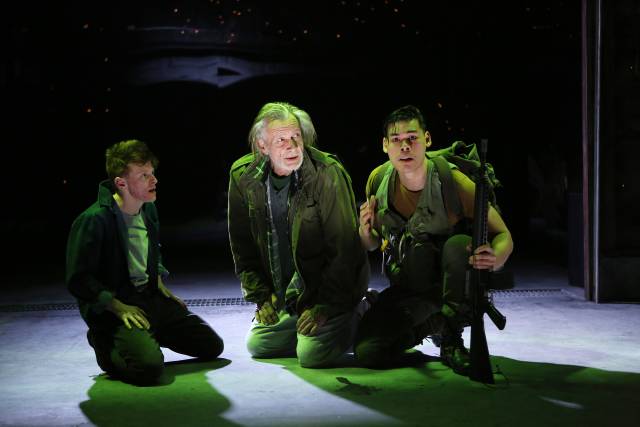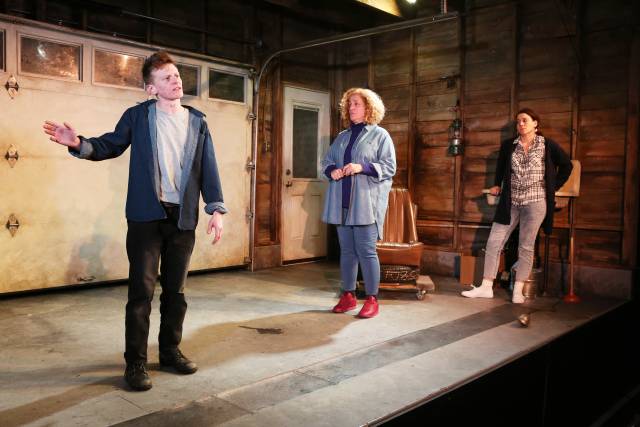

Even though Orange Julius has some elements that would lead some people to label it as either a “queer” or “Vietnam” play, its writer Basil Kreimendahl has managed to juggle with these elements in such way that the play defies easy categorization. Rather, it’s a moving memory exercise in which we see a father and son try to make the most out of their time together. Julius (Stephen Payne) is a Vietnam vet dying because of the effects of Agent Orange, meanwhile his transgender son Nut (Jess Barbagallo) is trying to connect with him and learn more about why he chose to fight the battles he fought.
That neither the war, nor the son’s gender are the main focus of Orange Julius makes it one of the most exciting productions to have premiered in New York City in recent years. Kreimendahl is one of a few transgender playwrights who are playing by their own rules and challenging the notion that transgender artists can only talk about being transgender. I spoke to the playwright about how he balanced the different styles, casting his friend Jess Barbagallo as Nut, and the role theatre will have in the current world.
How often do people assume your work is autobiographical just because it features transgender characters?
People ask me if it’s autobiographical a lot. It’s a very personal play, but it’s not autobiographical. There’s a little bit of personal in there for sure.
The play balances realism with whimsy, how do you hold a structure like this together without letting one aspect overcome the other?
I think the play has an emotional structure as opposed to a plot structure. One memory takes you to the next one and so on. The linkage isn’t always so easy to understand why, but the emotion links them together. The Vietnam scenes tell a separate story for instance, about the son/father comradery.
In terms of the research you had to do about Agent Orange, what would you say were some of the facts that surprised you most?
There’s talk in the play about who manufactured it, the effects it had on people, and the way it decimated the landscape of Vietnam, which was beautiful and was destroyed. Even the physical deformities in children who were born of parents exposed to Agent Orange. This is a family play but it’s about outside forces that affect them.
Jess Barbagallo is also a playwright, how did this influence the character he plays?
My first thought was for Jess to play Nut, he did a reading at New York Theatre Workshop in 2012 and he was who envisioned to play him. I feel grateful he liked the play enough to get on board. I feel that because he’s a playwright he understood the language in the way I meant it, and he used this language in the best way possible.
What was the rehearsal process like? Did you work on chemistry exercises to develop the family relationships?
We had a very short rehearsal because of the holidays. The actors worked really hard and bonding happened in the weeks leading to previews. We cast them because we thought each actor was such an interesting individual performer. Mary Testa is amazing.

She’s the best! After watching the play I had a conversation with other people who asked me about pronouns and elements they didn’t know about transgender people. As a transgender playwright how much of your work do you feel it is to educate people? Does this ever become frustrating, or do you feel it’s something that must be done?
I feel that sometimes it is educating, but if I felt my job was to educate them I would explain all of the gender stuff in Orange Julius. All of the memories happen before Nut transitions, that’s important because a trans man always goes through a part where he once was a daughter. That part of our lives isn’t erased, it’s complicated to talk about it and it should be complicated. If I’m thinking of how I’m educating them it’s to show them how complicated it is.
Given the state of the country, what do you think will be the role of theatre in helping these conversations about diversity?
Our job as always is to keep giving voice to these stories. I hope in ways that people can relate to, even if they’re not their stories. I hope that’s what we’ve done, there are universal themes in the play that I feel people can relate to.
Even though there are many plays about fathers/sons, I found yours so moving, it made me think of To Kill a Mockingbird. Did you have any specific references that inspired you?
I’m probably influenced by so many things including To Kill a Mockingbird, in my subconscious I’m sure there were many things.
You workshopped this play at the Eugene O’Neill Theater Center, can you talk about how important this experience was for you?
It’s such a special program. Really it’s a low pressure, gigantic workshop, you sorta get previews with different audiences after the workshop. You get to work on your play for a whole month which is unprecedented, they give you tech, designers, dramaturgy, I’ve never seen that anywhere else. At the O’Neill is where all the Vietnam scenes got created, and they’re in the final play.
Orange Julius runs through February 12. For tickets and more information click here.